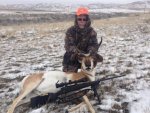Take pictures of every hunt. Whether you are solo or with others. You never know which hunt could be your last for some reason.
Like Brandon said, pack only what need. Be confident in your ability and equipment.
Try to stay calm after a kill. I still tend to freak out to "get this animal out of the woods". Some of my stupidest ideas come when I am jacked up after a kill.
Like Brandon said, pack only what need. Be confident in your ability and equipment.
Try to stay calm after a kill. I still tend to freak out to "get this animal out of the woods". Some of my stupidest ideas come when I am jacked up after a kill.


